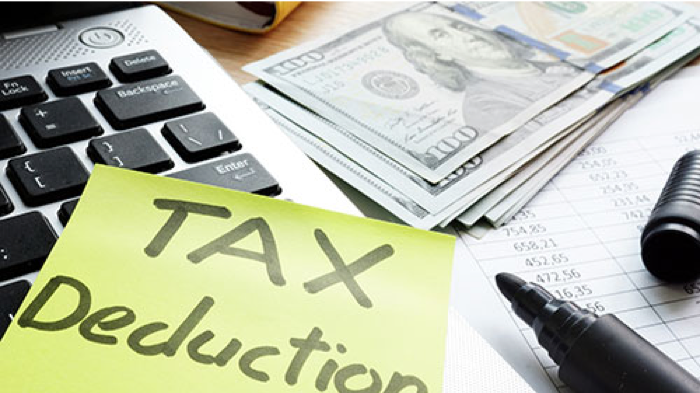Tax Resolutions for 2021
Nobody looks forward to paying taxes, but a bit of preparation and planning can go a long way toward easing the stress for your small business. As...
Manage your everyday finances with convenient accounts, flexible cards, and personalized service designed to fit your life.
At First Federal Bank, we offer flexible mortgage solutions for almost any situation, helping you secure the right financing for your dream home.
Business banking offers secure financial management, streamlined transactions, credit options, and tools to help businesses grow efficiently and sustainably.
2 min read
First Federal Bank : September 29, 2023 10:00:00 AM EDT

 As a small business owner, it is crucial to stay vigilant against tax scams that can potentially harm your financial well-being. Fraudsters are continuously evolving their tactics, making it critical to educate yourself on common tax scams. By being aware and taking proactive measures, you can safeguard your business and personal information. In this article, we will explore prevalent tax scams and provide tips to protect yourself:
As a small business owner, it is crucial to stay vigilant against tax scams that can potentially harm your financial well-being. Fraudsters are continuously evolving their tactics, making it critical to educate yourself on common tax scams. By being aware and taking proactive measures, you can safeguard your business and personal information. In this article, we will explore prevalent tax scams and provide tips to protect yourself:
Phishing scams
One common technique used by cybercriminals is phishing. These scams typically involve deceptive emails or phone calls pretending to be from the IRS or other government agencies. The goal is to obtain sensitive information such as Social Security numbers, bank account details, and passwords. The IRS will never initiate contact via email, text messages, or social media.
According to the IRS, “If you receive an email claiming to be from the IRS that contains a request for personal information, taxes associated with a large investment, inheritance or lottery,” don’t reply, don’t open any attachments, and don’t click on any links. Always exercise caution when you receive unsolicited emails or calls requesting personal or financial information, and verify the legitimacy of any communication by contacting the IRS directly through their official channels.
Identity theft
Identity theft can have severe consequences, both financially and personally. Tax-related identity theft occurs when someone uses your stolen Social Security number to file fraudulent tax returns, claiming refunds in your name. The FTC says to detect identify theft, you can review your bills, check your bank account statements, and review credit reports for any signs of unauthorized activity. “If you stop getting a bill, that could be a sign that someone changed your billing address."
Safeguard your personal information, especially your Social Security number. Use strong, unique passwords for all your online accounts and consider using two-factor authentication for added security. Additionally, shred any physical documents containing sensitive information before discarding them.
Fake charities
During tax season, scammers often take advantage of people’s generosity by creating fake charities. They use these bogus organizations to solicit donations and provide fake tax deductions, luring unsuspecting individuals into fraudulent schemes. To avoid falling victim to fake charities, it is essential to research and verify the legitimacy of any charitable organization before making donations. Be cautious of high-pressure tactics or emotional appeals.
The FTC recommends using reputable websites like BBB Wise Giving Alliance, Charity Navigator, CharityWatch, and Candid to research charities. You can also verify the tax-exempt status of the charity with the IRS using their Exempt Organizations Select Check tool.
Preparer fraud
As a small business owner, hiring a tax preparer can save you valuable time. However, some unscrupulous tax preparers may engage in fraudulent activities, including inflating deductions, fabricating expenses, or claiming false credits to increase refunds. They may also charge exorbitant fees or promise unrealistic refunds to lure clients.
To protect yourself from preparer fraud, research and select a tax preparer with a good reputation and credentials. Verify their Preparer Tax Identification Number (PTIN) with the IRS. Review and understand all documents before signing, and ensure the tax preparer signs the return and provides you with a copy. “Not signing a return is a red flag that the paid preparer may be looking to make a quick profit by promising a big refund or charging fees based on the size of the refund,” warns the IRS.
Protecting yourself from tax scams is crucial for small business owners. By being aware of common scams like phishing, identity theft, fake charities, and preparer fraud, you can mitigate risks and safeguard your financial well-being. Stay informed, exercise caution, and utilize official resources to ensure your business and personal information remains secure.

Nobody looks forward to paying taxes, but a bit of preparation and planning can go a long way toward easing the stress for your small business. As...

Receiving a letter from the Internal Revenue Service informing you your business is being audited is enough to stop you cold. But if you have taken ...

If your business has grown to operating in more than one state, you will need to file taxes for each location. Doing so can be tricky, but knowing...
Manage your accounts, make payments, and more.
Open an account with us.